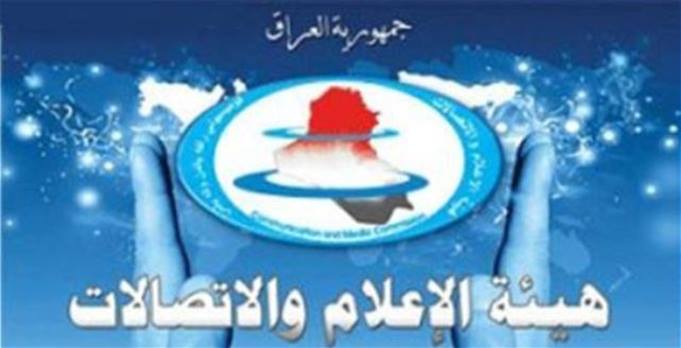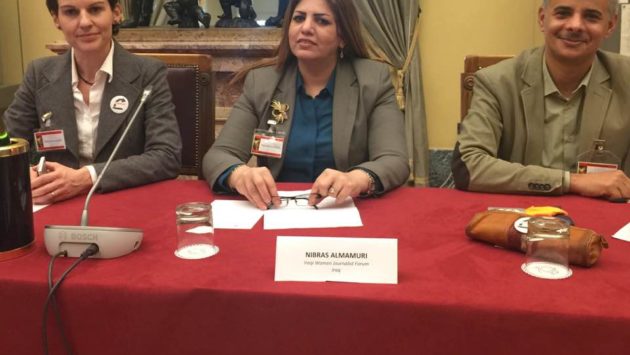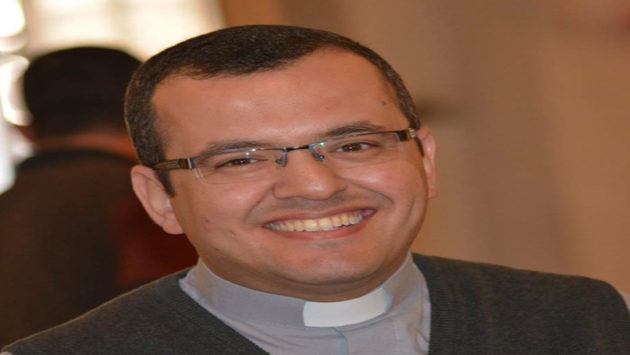Iraq: New Guidelines Silence Media
Emergency Decree Also Puts Pressure on Critical Reporting
JULY 3, 2014 – Human Rights Watch
(Baghdad) – Iraq’s new media guidelines are so vague as to be wide open to abuse. The guidelines unjustifiably restrict freedom of the press, including by requiring pro-governmental coverage. The government-run Communications and Media Commission (CMC) issued the “mandatory” guidelines on June 18, 2014, to regulate media “during the war on terror.”
The guidelines demand that media avoid making information about insurgent forces public and requires them to report on government forces only in favorable terms. Article 1 forbids media from broadcasting or publishing material that “may be interpreted as being against the security forces” and instead insists that they “focus on the security achievements of the armed forces, by repetition throughout the day.” This includes “praising the heroic acts of security personnel.”
“The Iraqi government’s new guidelines seem to force the media to stop reporting and become a government public relations appendage,” said Joe Stork, deputy Middle East and North Africa director. “These guidelines are a clear attempt to prevent critical coverage of important events and silence debate as the country goes through this intense security and political crisis.”
Staff with independent Iraqi media outlets have told Human Rights Watch of pressure, including threats of license revocation, from the media commission and government officials because of their critical reporting.
Iraq declared a state of emergency on June 10. But under international law, even during a state of emergency, the government may restrict freedom of expression only to the extent strictly necessary for the exigencies of the situation. On no account can even a genuine emergency justify the authorities requiring pro-government coverage.
Some Iraqi media outlets are known for their sectarian polemics, including some that incite violence, but these latest restrictions go well beyond what international law allows in times of emergency, unjustifiably shielding the government and security forces from criticism and accountability, Human Rights Watch said. They are also apparently being applied arbitrarily, as no pro-government channels have been targeted with warnings or closures.
Broadcasting a statement from an armed group or an interview with one of its members is forbidden, article 5 says. “Do not seek a ‘scoop’ at the expense of your country,” the guidelines warn.
Article 9 requires media to “spread enthusiasm and a fighting spirit against terror.” This means routinely broadcasting “patriotic anthems and teeming crowds and the heroic deeds of our security forces.”
The state of emergency that Prime Minister Nuri al-Maliki decreed on June 16 authorizes the government to restrict the media. Article 8, paragraph 11 of the emergency declaration requires all media to submit all material for review prior to publishing or broadcast, though Human Rights Watch has not been able to determine whether this requirement is being enforced.
Paragraph 13 of the emergency decree allows officials to monitor “emails and all electronic and wired and wireless communications.”
The extent to which the government is monitoring journalists’ and others’ communications is unknown, but Iraqi journalists have told Human Rights Watch that they routinely do not speak about sensitive matters on the phone or online.
On May 26, during government clashes with Sunni armed groups in Anbar province, the Media Commission director, Dr. Safaa al-Din Rabia, sent a letter to all media threatening outlets that “support terrorists groups through media by publishing the operations of these groups.” Those who fail to respect the rules “will be held accountable,” Rabia warned, but did not elaborate.
On June 21, the commission sent a letter to a media outlet that has reported critically about the government and did not want to be named for fear of retribution. “Because your broadcast programming is threatening national security, we warn you to be more careful,” the letter said. “If this kind of broadcasting is repeated your license will be revoked.”
On June 24, Egypt’s broadcast regulator said it barred two privately owned Iraqi television stations based in Cairo, Al-Baghdadiyya and Al-Rafidain, from Egypt’s main satellite system, Nilesat, after the Egyptian officials received complaints from Baghdad about the stations’ content.
Ziad al-Ajili, executive director at the Journalistic Freedoms Observatory (JFO), told Human Rights Watch that Al-Rafidain is known for its virulent pro-Sunni programming, and was “always inciting violence inside Iraq.” Al-Baghdadiyya, though, frequently broadcasts investigative reporting critical of the government, and is not known to have called for violence, he said. A few weeks earlier, Jordanian police closed Al-Abbasiyya TV in Amman, which has opposed Maliki, Reporters Without Bordersreported.
The head of Egypt’s broadcast regulator said in a statement to international media that authorities had taken Al-Baghdadiyya and Al-Rafidain off Nilesat because the stations had violated their contracts “regarding their content.”
The Iraqi government has frequently targeted Al-Baghdadiyya. Al-Ajili said that Al-Baghdadiyya’s messaging was balanced, calling for peace, unity, and fighting corruption, but was frequently targeted for its critical reporting. Authorities closed the station in December 2012, citing unspecified broadcast rules and an alleged failure to pay broadcast fees. The government earlier closed the station in 2010 for several months after it broadcast the demands of gunmen who had attacked a church in Baghdad and killed 58 people. The Media Commission said broadcasting those demands “amounts to incitement to violence.”
An Al-Baghdadiyya staff member told Human Rights Watch that about 16 police officers came to the station’s Baghdad office around June 20, beat two guards so badly that they required hospitalization, and confiscated some of the station’s equipment.
“We tried to reach out to various ministries and the CMC to solve the matter, but they refuse to even meet with us,” the staff member said.
The Iraqi government has also taken steps to close some news and social media websites, and in some places has tried to block the Internet completely. The state-owned Telecommunications and Post Company blocked some social media platforms on June 13, including Facebook, Twitter, Skype, and YouTube. Al-Ahram news agency reported that the ban was lifted on June 30 but some websites remain blocked in some areas. Residents of Tikrit and Mosul told Human Rights Watch that they still have little to no Internet access.
The government has taken no known action against media outlets that support the government or pro-government Shi’a militias, such as Al-Itijah TV, operated by the Kita’ib Hezbollah militia, and Al-Ahd TV, operated by the Asa’ib Ahl al-Haqq militia.
The state-run television station Al-Iraqiyya frequently broadcasts confessions of what it calls captured terrorists, apparently before they have appeared before a judge. The UN Human Rights Committee has stated that the media should avoid news coverage undermining the presumption of innocence.
International media are not immune and are also being targeted. On June 12, the pan-Arab Al-Arabiya TV said the Iraqi government had threatened to close its Baghdad bureau and ban correspondents of Al-Arabiya and its sister station, Al Hadath, from reporting in the country.
“Maliki wants to punish Al-Arabiya as he did when he closed a large number of newspapers and television stations during the past few years only because those media outlets criticized his policies,” said Al-Arabiya’s general manager, Abd al-Rahman al-Rashed.
On June 19, on state-run Al-Iraqiyya TV, an official from the Oil Ministry threatened international wire services for publishing what he claimed was misinformation about fighting at the oil refinery in Beiji.
Human Rights Watch has documented how in the past the government has arrested and prosecuted journalists who reported on government corruption or abuse.
“The Iraqi government is cracking down on critical media at a time when facts and debate are required,” Stork said. “Shutting stations on spurious charges without due process while letting pro-government media incite violence and break the law reveals the double-standard.”





